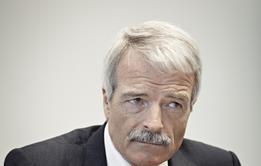As the NHS turns 65, what is the state of the service and what does its future hold? Former Financial Times public policy editor Nick Timmins spoke to health leaders on behalf of the Nuffield Trust for their assessment. Here HSJ presents highlights of his interview with Lord Darzi
I have been in the NHS since 1990: maybe I am getting older and a bit more cynical, but I don’t think there is enough stamina in the system to deal with the challenges that are facing us, whether the economic ones or the health burden. Most clinicians are disappointed with a lot of unfinished business. It is coming in spades and more so since April, for the simple reason that there’s a vacuum of strategic leadership.
‘To remain viable, the NHS needs an aligned political and clinical leadership, if that is ever possible’
Now, I’m not in any way supporting the strategic health authorities because I think a number of them failed to have strategic leadership. But there is a vacuum of strategic leadership, and I don’t think there is the resilience in the system to deal with the tsunami that is about to hit us, which we have known is coming for three years.
The handling of the Health Bill had a seriously detrimental effect on NHS England, which was still busy launching itself. What happened with Sir David Nicholson hasn’t helped, and then there is Francis. Those have been three major things over the past 18 months that would be difficult for any organisation trying to launch itself. None are nuclear bombs; all are significant challenges. And there is a leadership vacuum. And we have the financial tsunami.
I don’t think the NHS has any lifeboats out there and I think this thing will hit us by the time Sir David leaves and the new person starts. And it is not going to be the 1 per cent deficit that fired Nigel Crisp. Something worse.
Political maturity
Firstly, to remain viable, the NHS needs an aligned political and clinical leadership, if that is ever possible. I am not sure the politics has the maturity to do that. I think it nearly got there in London, when we did the health reforms for the capital. But that became contaminated when I became a Labour minister and everyone turned on it. And the political leadership that was required to see through High Quality Care for All and ensure it was implemented didn’t happen.
‘We need to engage the public, get them with us. And we need the political and clinical leadership’
Secondly, no further restructuring in the next 10 years. Thirdly, more transparency into the system, acknowledging the fact that certain organisations will not be viable.
Finally, a huge, huge, huge public engagement and education job over what we mean by quality and over rebuilding expectations of what is local − what types of services might be available if we are to get the highest quality. If we fudge all that, we will see more Mid Staffs. We need to engage the public, get them with us. And we need the political and clinical leadership and the transparent agenda to meet these challenges.
Disruptive technology
The opportunities in the next decade that will possibly disrupt the NHS will be technological. Technology will disrupt the way in which we do risk stratification and wellbeing and prevention and the way in which we deliver healthcare, including service delivery. We will have a much smaller number of specialised hospitals, a larger number of community type provision, better integration of health and wellbeing and prevention and social care. That is, the things we have been talking about for 10 years.
‘We missed the best opportunity in the history of the NHS to actually reform it. We just threw money at it’
The NHS has always responded to threat, and I think the tsunami could be turned into an opportunity. But that won’t happen unless you have the engagement of the clinical leadership aligned with political leadership to make it happen. Otherwise, a tsunami could be quite destructive.
In the last 10 years, the injection of money did a lot of good. There was a huge amount of progress, fantastic outputs and outcomes. But we missed the best opportunity in the history of the NHS to actually reform it. We just threw money at it, rather than actually reforming it.
‘I think co-payment will creep in. Probably around something to do with patient experience. But I am fearful of it’
Alan Milburn always said, “The money will come but we have to reform it.” But he left. And I don’t know whether even he would have the balls to make the changes required now. It is going to be much more difficult to make the changes now there is no money.
Can the NHS remain largely free at the point of use? I think co-payment will creep in. Probably around something to do with patient experience. But I am fearful of it. Once it starts to creep in, it is so difficult to police. How do you have it without eroding some of the fundamental values of the NHS?
The full text of all this interview and others can be found in the Nuffield Trust’s Wisdom of the crowd: 65 views of the NHS at 65 report.
Lord Darzi is a former health minister. He holds the Paul Hamlyn Chair of Surgery at Imperial College London, the Royal Marsden Hospital and the Institute of Cancer Research. Nick Timmins was public policy editor at the Financial Times
The NHS at 65: not ready to retire

‘The NHS is one of the noblest social institutions any country has ever created’
- 1
 Currently
reading
Currently
reading
We missed the best opportunity to reform the NHS
- 3
- 4
- 5
- 6






































4 Readers' comments